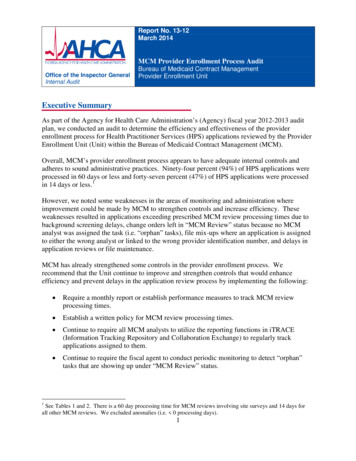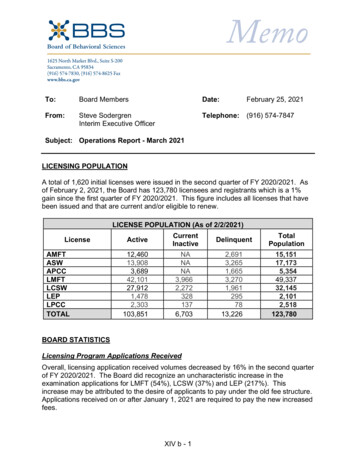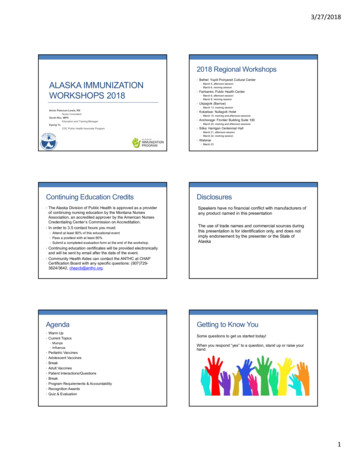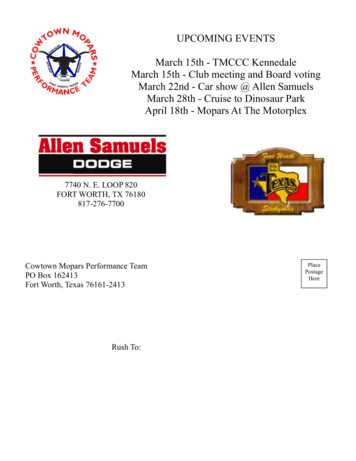
Transcription
Report No. 13-12March 2014MCM Provider Enrollment Process AuditOffice of the Inspector GeneralInternal AuditBureau of Medicaid Contract ManagementProvider Enrollment UnitExecutive SummaryAs part of the Agency for Health Care Administration’s (Agency) fiscal year 2012-2013 auditplan, we conducted an audit to determine the efficiency and effectiveness of the providerenrollment process for Health Practitioner Services (HPS) applications reviewed by the ProviderEnrollment Unit (Unit) within the Bureau of Medicaid Contract Management (MCM).Overall, MCM’s provider enrollment process appears to have adequate internal controls andadheres to sound administrative practices. Ninety-four percent (94%) of HPS applications wereprocessed in 60 days or less and forty-seven percent (47%) of HPS applications were processedin 14 days or less. 1However, we noted some weaknesses in the areas of monitoring and administration whereimprovement could be made by MCM to strengthen controls and increase efficiency. Theseweaknesses resulted in applications exceeding prescribed MCM review processing times due tobackground screening delays, change orders left in “MCM Review” status because no MCManalyst was assigned the task (i.e. “orphan” tasks), file mix-ups where an application is assignedto either the wrong analyst or linked to the wrong provider identification number, and delays inapplication reviews or file maintenance.MCM has already strengthened some controls in the provider enrollment process. Werecommend that the Unit continue to improve and strengthen controls that would enhanceefficiency and prevent delays in the application review process by implementing the following: Require a monthly report or establish performance measures to track MCM reviewprocessing times. Establish a written policy for MCM review processing times. Continue to require all MCM analysts to utilize the reporting functions in iTRACE(Information Tracking Repository and Collaboration Exchange) to regularly trackapplications assigned to them. Continue to require the fiscal agent to conduct periodic monitoring to detect “orphan”tasks that are showing up under “MCM Review” status.1See Tables 1 and 2. There is a 60 day processing time for MCM reviews involving site surveys and 14 days forall other MCM reviews. We excluded anomalies (i.e. 0 processing days).1
Require the fiscal agent to conduct periodic monitoring to detect applications in Return toProvider (RTP) status or have been sent to the wrong analyst for review, and are showingup under “MCM Review” status. Run a weekly report to identify tasks due within the week to alert both analysts andsupervisors, and require monitoring of analysts at regular intervals to help ensureapplications are handled appropriately and in accordance with processing time frames.Scope, Objectives, and MethodologyThe scope of the audit covered an examination of HPS applications referred for MCM review 2that resulted in enrollment or denial during the period July 1, 2012 through December 31, 2012.Our objectives were to determine the efficiency and effectiveness of the MCM review processutilized when a Medicaid enrollment application is referred for MCM review.To accomplish our objectives, we reviewed applicable laws, rules, and regulations; interviewedstaff of the MCM Provider Enrollment Unit; reviewed established or stated policies, processes,procedures, contracts, and related documents; observed and documented operations; reviewedrecords, reports, and other applicable documentation; and reviewed a sample of applications thatexceeded the prescribed MCM review processing time.BackgroundThe MCM Provider Enrollment Unit under the Division of Medicaid works in conjunction withthe Medicaid fiscal agent to enroll Medicaid providers. The Florida Medicaid ManagementInformation System (FMMIS) is the information system currently utilized to enroll providers,reimburse providers, and maintain eligibility and provider enrollment data. The FMMISProvider functional area is used to research and maintain provider records and contains allrelevant provider information, including provider identification numbers, owners, affiliations,billing agents, locations, specialties, addresses, contacts, email addresses and backgroundscreening status. Access to the Provider functional area is limited to the fiscal agent and Agencystaff authorized to work with or view provider master files.In order to receive Medicaid reimbursement, a provider must be enrolled into the Medicaidprogram and meet all the requirements and qualifications set forth in the Florida MedicaidCoverage and Limitations Handbooks incorporated by reference in Rule 59G-4, FloridaAdministrative Code (F.A.C.), Medicaid enrollment forms incorporated by reference in Rule59G-5.010, F.A.C., and the legal requirements set forth in Section 409.907, Florida Statutes(F.S.).2Due to background screening, site surveys, change of ownership, U.S. Department of Health and Human Services,Office of the Inspector General (HHS/OIG) exclusions, and previous terminations and denials.2
The Unit is responsible for reviewing Medicaid provider applicant eligibility for all applicationsthat require state review before activation. These include all applicants with: previousterminations, HHS/OIG exclusions, changes of ownership, and suspended payments fromMedicare. The Unit also reviews background screening and surety bonding, performs addressverifications, and verifies Medicare and other certifications. In addition, the Unit obtains allcourt documents showing the dispensation of any criminal charges identified, and coordinatesannual site surveys with the Medicaid area offices.The fiscal agent is responsible for receiving and processing applications for providerparticipation in the Florida Medicaid program, processing file maintenance (FM) requests,maintaining electronic provider files, and answering provider queries regarding enrollmentrelated matters.Currently, fiscal agent activity is monitored and measured through the report card process andperformance measures posted on the Agency’s internal dashboard. The dashboard tracks thenumber of applications, web and non-web, that are received, processed, and result in approval ordenial. It also tracks the fiscal agent’s monthly processing time for each of the followingprovider type categories: Health Practitioner Services (HPS), Health Facility and AncillaryServices (FAS), Child Health Services (CHS), Behavioral Health Care (BHC), Long Term Care(LTC), and Developmental Disabilities and Special Programs (DDSP). Examples of recentlyposted application processing dashboard measures follow:Agency Dashboard Performance MeasuresMedicaid Provider Enrollment Application Processing TimeOctober 2013WEBNON-WEBReceipttoQC/RTPDays inRTPStatusDays fromRTP Statusto RTPDays inRTPStatusDays fromRTP Statusto Closure
WEB6050404443033201008Days from RTP Statusto Closure31616422614Days in RTP Status3219241411Receipt to QC/RTP14FAS CHS HPS BHC LTC DDSPNON-WEB908037060250Days in RTP Status6840301202353100Days from RTPStatus to Closure258538Receipt to QC/RTP5516112171FAS CHS HPS BHC LTC DDSPThe fiscal agent report card developed by the Agency and tested by the fiscal agent monitors andmeasures the success of the fiscal agent’s performance on a monthly basis and results in anumeric score. The report card methodology utilizes sampling to determine if the fiscal agenthas met standards outlined in the contract. The outcomes are reviewed by MCM and areapproved or sent for corrective action.4
Provider Management Report Card Areas Measured:Provider Enrollment ProcessingI. Enter provider's application into FMMIS within two (2) workdays of receipt.II. Process provider applications within seven (7) workdays of logging application in FMMIS. Measurement shouldstart the next business day after item 1 is complete.III. Enroll and activate providers within two (2) workdays of the date the applications meet all requirements forenrollment including background screening and any state review.IV. Ensure all provider enrollment requirements were enforced and all data entry is accurate for applications activatedduring the audit month.V. Ensure entire application and supporting documentation are accurately imaged and viewable.VI. Document enrollments and send notice of enrollment to enrolled providers within five (5) workdays of completionof enrollment.Provider CommunicationsI. Respond to written provider inquiries in writing within five (5) workdays.II. Monitor calls for adherence to procedures and policy, noting quality and accuracy.Provider MaintenanceI. Complete accurately all provider file updates received from providers or the State within one (1) workday of receiptunless the State grants another time frame.Source: 2012 Fiscal Agent Report CardSince the fiscal agent application processing activity is tracked by both the report card and thedashboard measures, we focused our audit on the review process conducted by the Unit when thefiscal agent refers an application for MCM review. Neither the report card nor dashboardmeasures capture the Unit’s processing time. MCM review is required for the following reasons: Approval for specific provider types Site surveys Change of ownership Previous background screening Reviews of applicants with previous adverse terminationsIn addition an application is sent for MCM review if any of the individuals listed in theapplication have ever: Been convicted of a felony, had adjudication withheld on a felony, pled nolo contendereto a felony, or entered into a pre-trial agreement for a felony; Had any disciplinary action taken against any business or professional license held in thisor any other state or surrendered a license in this or any state; Been denied enrollment, been suspended or excluded from Medicare or Medicaid in anystate, or been employed by a corporation, business or professional association that hasever been suspended or excluded from Medicare or Medicaid in any state; Had suspended payments from Medicare or Medicaid in any state, or been employed by acorporation, business or professional association that ever had suspended payments fromMedicare or Medicaid in any state;5
Owed money to Medicaid or Medicare that has not been paid; or Had ownership in any other Medicaid enrolled business.We examined the MCM review process for the HPS provider category, which has the largestnumber of provider applications for non-institutional providers. Between July 1, 2012, andDecember 31, 2012, the Unit reviewed a total of 1,064 applications in the HPS category out of atotal 2,451 applications which were enrolled or denied. The HPS category is comprised ofphysicians, podiatrists, chiropractors, physician assistants, nurse practitioners, registerednurses/registered nurse first assistants, medical assistants, hearing aid specialists, licensedmidwives, dentists, audiologists, optometrists, opticians and birth centers.Tables 1 and 2 stratify the 1,064 HPS applications into 14 and 30 day increments. Nineapplications which show up as 0 days in “MCM Review” status represent an anomaly in theMCM review dates entered into FMMIS and were therefore excluded from our test sample.Table 1: Stratification of HPS Applicationsin MCM Review Days by 14 day incrementsNumberof DaysinMCMStatus 0Table 2: Stratification of HPS Applicationsin MCM Review Days by 30 day incrementsNumber ofApplications% of TotalApplicationsNumber ofDays in MCMStatusNumber ofApplications% of TotalApplications91% 251%1,064100.00 %133-14710% 14720%1,064100.00 %As shown in the tables above, ninety-four percent (94%) of the 1064 HPS applications wereprocessed in 60 days or less and forty-seven percent (47%) of HPS applications were processedin 14 days or less. 3 From this population, we identified 221 applications that had the longestinterval period from the first date it was sent to MCM review to the last date it left MCM review.We then selected 35 applications for review which we subdivided into Group A and Group B.Group A consisted of HPS providers that required mandatory MCM review for site surveys.Group B consisted of HPS providers that did not require mandatory site surveys.3This excludes the 0 anomalies.6
Findings, Recommendations, and Management ResponsesMCM reviews involving site surveys have a 60 day processing time after receipt of a completeprovider application. Prior to July 1, 2013, the statutory requirement was that “The agency shallperform a random onsite inspection, within 60 days after receipt of a fully complete newprovider application ” The Unit also applied the 60 day processing standard for mandatory sitesurveys. On July 1, 2013, Section 409.907(7), F.S., was modified to do away with the timerequirement. The Unit Administrator stated that this was to give the Agency broader discretionto perform site surveys as needed to protect the Medicaid program; however, the Agency stilladheres to the 60 day processing time for site surveys.All other MCM reviews have a 14 day processing time. Once a new application is reviewed, itmay be RTP for additional information, forwarded to the field office for survey, or sent to thefiscal agent for activation or denial. If an application is resubmitted to MCM for additionalreview the “clock restarts.”The communications function regarding provider applications between the fiscal agent andMCM is managed through the Florida Interactive Portal (FIP) file maintenance system. FIP isutilized for tracking tasks communicated between MCM, the fiscal agent, and vice-versa. TheFIP File Maintenance Procedures document outlines the procedure for entering change orders(CO) into iTRACE or requesting file maintenance (FM). A Change Order is one of severaldelivery methods for file maintenance. File Maintenance is a request from the provider or theMedicaid Program to alter a provider’s record. Due dates are assigned based on the priority ofthe task as indicated below:PriorityDescription0 Emergency1 High2 Medium3 LowURGENT – Immediate response neededRUSH – By close of businessSTANDARD – 24 hoursNON-STANDARD – 48 hours, unless otherwise noted.The FIP document does not capture the amount of time required for site surveys, CHOWreviews, and other MCM reviews. It only captures when a task has been identified for review ora FM is requested. A delay in requesting a FM or initiating a CO is not captured within the FIPsystem.Using the information obtained from the FMMIS “Comments” field, iTRACE notes, andsupplemental iTRACE information, we accounted for the time period when our 35 sampleapplications went in and out of MCM review and compressed it to the time period when theapplications were actually in “MCM Review” status. 4 We then analyzed the timeliness ofapplication review and identified the primary reasons for processing delays. These were brokendown into the following categories: “Timely,” “Background Screening,” “Non-InstitutionalSubunit / File Maintenance,” “Fiscal Agent,” and “File Mix-ups.”4If an application was in MCM Status several times, only the actual number of days in MCM Status was counted.7
All of the applications sampled met the 60 day processing time for site surveys, and as shown inTable 3, thirty one percent (31%) of applications were reviewed timely which is 60 days for sitesurveys and 14 days for other reviews. The other areas in which MCM review processing timeswere exceeded are shown and discussed further in Findings 1-4.Table 3: Summary of Results for Aging Applications TestedTimeliness or PrimaryReasons for DelayAge in MCMStatusGroup AGroup BCombined Totals%Distributionn/a1101131%Background ScreeningNon-Institutional Subunit /File Maintenance33 - 139 days4*71131%30 - 162 days43720%Fiscal Agent78 - 122 days3039%File Mix-ups121 - 190 days3039%TimelyTOTAL152035100%*1 application tested involved a Background Screening processing of 111 days and a Fiscal Agent delay of 13 days. The totalnumber of days in “MCM Review” Status was 139 days.Group A20% 6%20%Group B15%27%35%27%TimelyBackground Screening DelayNon-Institutional Subunit DelayFiscal Agent DelayFile Mix-up Delay50%TimelyBackground Screening DelayNon-Institutional Subunit DelayGroup A - HPS providers that do requiremandatory site surveys.Group B – HPS providers that do not requiremandatory site surveys.8
Finding 1: Delay in Background Screening ReviewThirty-one percent (31%) of the sampled aging applications reviewed or a combined total of 11out of the 35 applications involved a delay in a background screening review. The applicationswere in “MCM Review” status from 33 to 139 days. One application was delayed as a result of abackground screening delay of 111 days and a fiscal agent referral delay of 13 days.The background screening analyst reviews the following: previously approved background screening in the past 12 months “not eligible” background screenings “previously termed or denied” background screenings (D3 or T1) Question 30 A reviewsThere is only one analyst tasked to review background screenings. She stated that she performeda lot of manual processing and reviewed approximately 300 to 400 background screeninginquiries from providers and the fiscal agent per week during the audit period between June 1,2012, and December 31, 2012. In addition, she was primarily utilizing emails from the fiscalagent, and not the FIP system iTRACE reports, to monitor MCM reviews assigned to her. Theemails were “hit or miss” since initially there were problems in adding her to the FIP system.According to the Unit Administrator, staff now run reports to ensure they see everything sent tothem instead of just relying on email alerts. He also pointed out that due to the confidentialnature of the background screening inquiry, delays may be caused by applications sent back to aprovider for further information without going through the fiscal agent and being put into RTPstatus, or applications awaiting further information from Medicaid Program Integrity (MPI) orMedicaid Fraud Control Unit (MFCU). Since applications are still under “MCM Review” statusduring the time that further information is being sought this shows up as a longer processing timeunder MCM review.According to Unit staff, in June 2013 the BGS system has started to automatically uploadinformation into FMMIS on a daily file. This has freed much of the manual processing andreduced the number of background screening inquiries.Finding 2: Non-Institutional Subunit Review or FM DelayTwenty percent (20%) of the sampled aging applications reviewed, or a combined total of 7 outof the 35 applications, involved a delay in the application review or file maintenance in the NonInstitutional subunit. Site survey documentation attached to COs reviewed reflects that sitesurveys were completed within 60 days, often less than 30 days, from the time assigned. TheFMMIS and iTRACE comments did not indicate the reasons for a delay in the review or FM.The applications in this category were under “MCM Review” status from 30 to 162 days.9
Finding 3: Fiscal Agent Referral Delay/ “Orphan” TasksNine percent (9%) of the sampled aging applications reviewed, or a combined total of 3 out ofthe 35 applications, involved a delay on the part of the Fiscal Agent by either a delayed referralto a specific MCM analyst whereby an application is placed into “MCM Review” status but noanalyst was assigned to review (i.e. “orphan” tasks) or a delay in task completion even after a filemaintenance is entered by an MCM analyst. The applications in this category were under“MCM Review” status from 78 to 122 days.A procedure which would require all applications that are placed in MCM review be assigned toa specific MCM analyst would help to manage delays. This did not exist at the time of thereview.In the spring of 2013, the fiscal agent started running a weekly report that identifies “orphan”tasks by pulling all open COs with no state participant (MCM analyst) from the previous sevendays. This enables the fiscal agent to identify applications under “MCM Review” status thathave not been assigned to a specific analyst. MCM analysts now also run reports to help ensurethey see all their assigned COs and not just rely on email alerts.Delays in task completion after an MCM analyst requests a file maintenance, can be preventedand detected by regularly running reports that would indicate aging applications, doing qualitychecks, and tracking applications that are aging in “MCM Review” status.Finding 4: File Mix-upsNine percent (9%) of the sampled aging applications reviewed, or a combined total of 3 out ofthe 35 applications, involved a file mix-up delay. The FMMIS and iTRACE comments indicatethe delays were caused by linking the wrong provider ID or name to an application or referringthe application to the wrong MCM analyst for review. The applications in this category wereunder “MCM Review” status for the longest period, from 121 to 190 days.The mix-ups can be prevented and detected by regularly running reports that would indicateaging applications, doing quality checks, and tracking applications that are aging in “MCMReview” status.10
RECOMMENDATIONS:As noted earlier, the vast majority of provider enrollment applications reviewed by the Unit wereprocessed timely. In addition, during the course of our review, the Unit was alreadystrengthening some controls over the provider enrollment process. We recommend that the Unitcontinue to improve and strengthen controls that would enhance efficiency and prevent delays inthe application review process by implementing the following:Recommendation 1:Require a monthly report or establish performance measures to track the MCM reviewprocessing times.Management Response: Designing, building, testing, implementing, and supporting new reports in production is morecostly than the risk. MCM will table new reporting until procurement of new FMMIS.Preliminary work toward that goal began in 2013 with final product in place July 1, 2018.Ultimately, there are several factors, outside of the control of MCM analysts, which maycause an application to take longer than the average time to process. Activities that canincrease MCM processing times include: site surveys, pre-certification reviews, changes ofownership for facility licensure, and rate setting.Anticipated date of completion: Accept risk. MCM will pursue the feasibility of adding new application status tracking codes, which willbe used to show in the FMMIS whenever an application has been forwarded for an actionoutside of MCM. The status tracking codes will not shorten the time these outside actionstake for completion. It will however aid applicants in understanding the exact whereaboutsof their application and avoid the impression the application has stalled.As part of the implementation of the new status tracking codes, MCM will also revise theEnrollment Status page on the Medicaid public portal to better display expected processingtimes and to supply contact points for questions regarding an application at any given stageof processing.Anticipated date of completion: June 1, 2014.Recommendation 2:Establish a written policy for MCM review processing times.Management Response:Agree, but cannot mitigate risk. MCM has begun design sessions for documenting desk levelprocedures. Completion of the documentation will be impacted by several high priority projects,including the Statewide Medicaid Manage Care rollout, the Affordable Care Act providerscreening implementation, and the 2014 Legislative Session. While MCM agrees with the needfor desk level procedures, those procedures can only impact the processes directly under thecontrol of MCM analysts. They cannot mitigate the risk of longer review times as the result ofwaiting for results of site surveys, pre-certification reviews, changes of ownership for facilitylicensure, and rate setting.Anticipated date of completion: September 1, 2014.11
Recommendation 3:Continue to require all MCM analysts to utilize the reporting functions in iTRACE to regularlytrack applications assigned to them. This will help ensure that applications do not “fall throughthe cracks” and do not exceed processing times unnecessarily.Management Response:MCM analysts currently utilize the reporting functions in iTRACE.Anticipated date of completion: Completed.Recommendation 4:Continue to require the fiscal agent to conduct periodic monitoring to detect “orphan” tasks thatare showing up under “MCM Review” status.Management Response:The Medicaid fiscal agent runs weekly reports and verifies all open Change Orders and there arespecific monitoring roles assigned to both state and fiscal agent analysts.Anticipated date of completion: Completed.Recommendation 5:Require the fiscal agent to conduct periodic monitoring to detect applications in RTP status orhave been sent to the wrong analyst for review, and are showing up under “MCM Review”status.Management Response:Design session held with Medicaid fiscal agent for creation of a new report which will identifyall applications in any status other than RTP which have an RTP letter generated for a later date.Fiscal agent staff will work the report weekly and will correct any application status that is inerror. The issue of tasks being assigned to the wrong analyst was corrected under response 6below.Anticipated date of completion: June 1, 2014.Recommendation 6:Run a weekly report to identify tasks due within the week to alert both analysts and supervisorsand require monitoring of analysts at regular intervals to help ensure applications are handledappropriately and in accordance with processing time frames.Management Response:MCM analysts run daily reports to capture their current workload. Supervisors run weeklyreports to identify outliers and work with the analysts to resolve. The daily reports also correctthe issue of tasks being assigned to the wrong analyst. These are able to be reassigned in atimely manner.Anticipated date of completion: Completed.12
Final CommentsInternal Audit would like to thank the management and staff of the Division of Medicaid, Bureauof Contract Management, Provider Enrollment Unit for their assistance and cooperation extendedto us during this engagement.13
The Agency for Health Care Administration’s mission is Better Health Care for AllFloridians.The Inspector General’s Office conducts audits and reviews of Agency programs toassist the Secretary and other agency management and staff in fulfilling this mission.This review was conducted pursuant to Section 20.055, Florida Statutes and in accordance withthe International Standards for the Professional Practice of Internal Auditing as established bythe Institute of Internal Auditors. The review was conducted by Pilar C. Alsiro, J.D. andShushan Gemora under the supervision of Mary Beth Sheffield, Audit Director, CPA, CIA, CFE,CIG. Please address inquiries regarding this report to the AHCA Audit Director by telephone at(850) 412-3978.Copies of final reports may be viewed and downloaded via the internet at:ahca.myflorida.com/Executive/Inspector General/Internal Audit/audit.shtmlCopies may also be obtained by telephone (850) 412-3990, by FAX (850) 487-4108, in person,or by mail at Agency for Health Care Administration, Fort Knox Center, 2727 Mahan Drive, MailStop #5, Tallahassee, FL 32308.14
The MCM Provider Enrollment Unit under the Division of Medicaid works in conjunction with the Medicaid fiscal agent to enroll Medicaid providers. The Florida Medicaid Management Information System (FMMIS) is the information system currently utilized to enroll providers, reimburse providers, and maintain eligibility and provider enrollment data.











